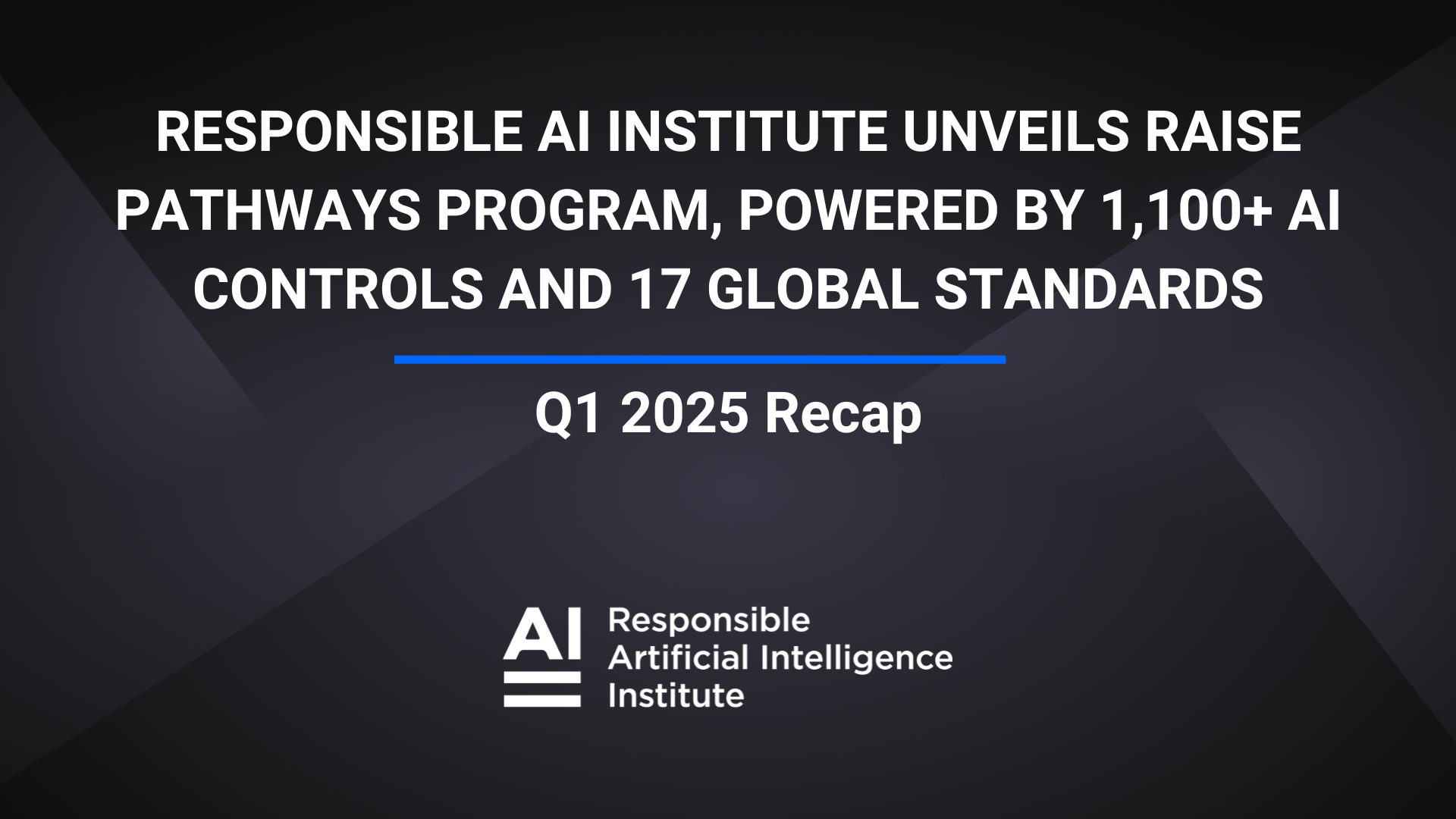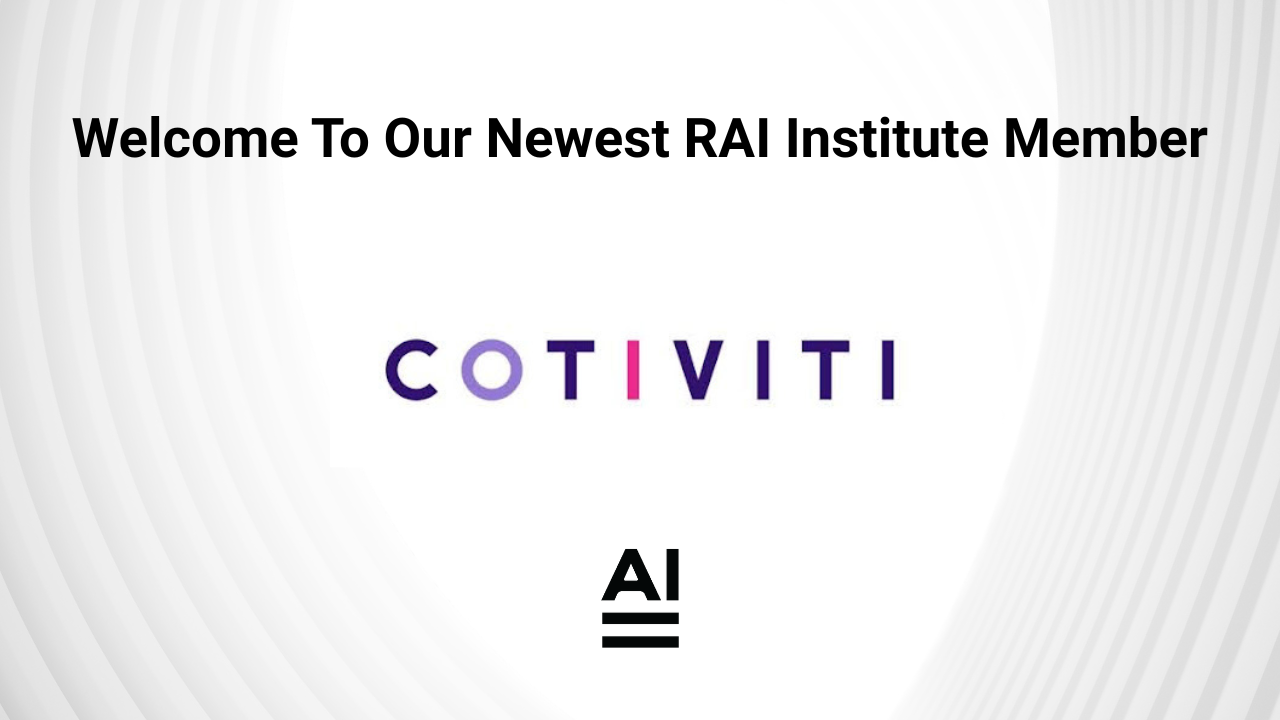Responsible AI Institute June 26, 2024 Webinar Recap
As AI continues to revolutionize industries across the globe, its impact on sustainability and environmental, social, and governance (ESG) goals is becoming increasingly apparent. The Responsible AI Institute’s most recent Virtual Event Series installment brought together experts working at the intersection of AI implementation and sustainability, highlighting both the challenges and opportunities that lie ahead.
Our panelists brought their unique perspectives on Ai and sustainability, namely:
- Pravin Chandran, Sustainability Data & Technology Leader at KPMG US, provided his perspective on the potential good that AI can do for sustainability and ESG.
- Andrea Ruotolo, Global Head, Customer Sustainability/ESG at Rockwell Automation, shared her expertise on responsible AI sustainability in the industrial sector.
- Leah Morris, Senior Director, Velocity Program at Radical Ventures contributed her thoughts on funding AI companies that are implementing responsible AI and sustainable initiatives.
- Boris Gamazaychikov, Senior Manager, Emissions Reduction at Salesforce, provided insights into developing a sustainable AI strategy within large, corporate enterprises.
- Alyssa Lefaivre Škopac, Head of Global Partnerships & Growth at Responsible AI Institute at Responsible AI Institute, moderated the discussion.
The Importance of Holistic Thinking
The panel expressed the need for a holistic approach when considering AI’s role in sustainability. Ruotolo emphasized that organizations must stop thinking about AI and sustainability in silos. Instead, companies should integrate their AI governance processes with their sustainability initiatives to ensure that AI applications drive both productivity and sustainability.
That being said, Gamazaychikov highlighted a significant concern: the enormous energy requirements of large language models (LLMs) and general-purpose AI models. He noted that some forecasts predict data center electricity consumption might quadruple by the end of this decade, potentially exacerbating climate change. However, he also pointed out that not all AI is created equal, and there can be a huge difference between the most polluting and most efficient models. Salesforce has focused on developing AI models tailored to specific use cases, such as their CRM-specific LLM, which is more energy-efficient and performs better for its intended purpose than general-purpose models.
The Role of Startups in AI Sustainability
Ensuring that the topic of AI sustainability is proactively addressed in the early stages of an AI model’s development, Morris discussed the importance of considering responsible AI practices in the startup ecosystem. She introduced the Responsible AI for Startups (RAIS) framework, an open-source tool designed to help early-stage companies assess and mitigate potential risks associated with their AI technologies. This approach underscores the critical role that investors and venture capitalists play in shaping the future of AI and sustainability.
Despite the challenges, the panelists were generally optimistic about AI’s potential to contribute positively to sustainability efforts. Chandran highlighted several areas where AI is already making a difference, from optimizing renewable energy systems, such as wind turbines and solar panels, to assessing climate risks and impacts on cities and infrastructure. He agreed that in order to maximize the potential of AI, responsible measures must be put in place.
The Business Case for Sustainable AI
Ruotolo emphasized that there’s a strong business case for integrating AI and sustainability initiatives. Companies that undertake this transformation are outperforming their peers by up to three times. Additionally, organizations with strong ESG performance are seeing higher shareholder returns and attracting more talent, particularly among millennials. The panel did acknowledge that regulation will play a crucial role in ensuring AI’s positive impact on sustainability. However, they also noted the challenges in creating effective regulations that can keep pace with rapidly evolving technology.
While Ruotolo stressed the need for a new approach to regulation that can adapt more quickly to technological advancements, Gamazaychikov called for greater collaboration and transparency in the AI industry, particularly when it comes to disclosing the environmental impacts of AI technologies. This sentiment was echoed by other panelists, who emphasized the importance of working together to address the complex challenges at the intersection of AI and sustainability.
Human Expertise Remains Critical
The panelists agreed that human expertise remains crucial in sustainability and ESG initiatives. Chandran noted that while AI can optimize processes and provide recommendations, humans will continue to make the final decisions, especially in areas like large-scale industrial investments in renewable energy. The panelists concluded the discussion on a cautiously optimistic note. They believe that AI has the potential to be a net benefit for our sustainable future, but stressed that this outcome depends on making the right choices today. Morris advised creating regulation that leaves the opening for new AI innovation as the technology advances, so as to not be counterproductive as various industries continue to learn and develop the science needed for emerging AI technologies.
As we continue to navigate the intersection of AI and sustainability, it’s clear that a thoughtful, collaborative approach is needed. By considering the environmental and social impacts of AI from the outset, fostering innovation in energy-efficient AI models, and working together across sectors, we can harness the power of AI to create a more sustainable future for all.
Supporting You on Your RAI Journey
Looking to stay informed about regulatory updates and learn how your organization can proactively prepare for coming AI regulation? RAI Institute invites new members to join in driving innovation and advancing responsible AI. Collaborating with esteemed organizations like those mentioned, RAI Institute develops practical approaches to mitigate AI-related risks and fosters the growth of responsible AI practices.
About Responsible AI Institute (RAI Institute)
Founded in 2016, Responsible AI Institute (RAI Institute) is a global and member-driven non-profit dedicated to enabling successful responsible AI efforts in organizations. We accelerate and simplify responsible AI adoption by providing our members with AI conformity assessments, benchmarks and certifications that are closely aligned with global standards and emerging regulations.
Members include leading companies such as Amazon Web Services, Boston Consulting Group, ATB Financial and many others dedicated to bringing responsible AI to all industry sectors.
Media Contact
Nicole McCaffrey
Head of Marketing, RAI Institute
+1 (440) 785-3588
Follow RAI Institute on Social Media
X (formerly Twitter)




